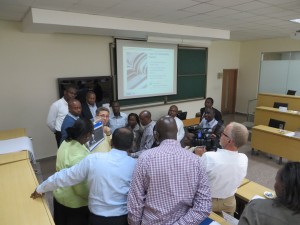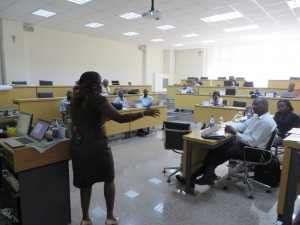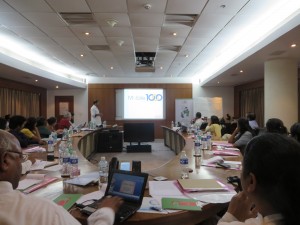GRI Certified Training Programme, Accra,Ghana
Global Reporting Initiative (GRI) G4 training in Accra, Ghana 2015
13-14 March 2015, 5-6 September 2015
MHCi through its subsidiary CSRFI leads the consortium to run GRI G4 Certified courses in sub-Saharan Africa. As well as Accra, described here, we shall hold training sessions in Nairobi, Mauritius, Lagos, Dakar with sessions under negotiation to be held in Gabarone, Luanda, Lusaka, Dar-es-Salaam and Maputo. Contact us for more details on any of the locations at enquiries@csrfi.com .
As an introduction to what CSRFI and its partners will offer, check out this video discussion of 6 minutes between Enrique Torres and Michael Hopkins on what you can expect from our GRI G4 two-day (or other arrangement) trainings.
You may pay now for this course and take advantage of our Early Bird offer (see ‘BUY NOW’ left side panel)
Above videos courtesy of Michiel van der Zeeuw, Amsterdam.
Contact us for more details on enquiries@csrfi.com
Course in Nairobi successfully completed in October 2014 – led by former GRI training Head, Enrique Torres (see above video)
Participants at Nairobi course and Head of Safaricom Sustainability Reporting, the brilliant (really!) Karen Basiye, pictured immediately above
The Global Reporting Initiative (GRI) is the most widely used framework for sustainability reporting. It helps companies to implement corporate social responsibility into their daily business and to report transparently on the social, economic and environmental performance of their organisation. GRI launched the G4 Guidelines in May2014 and is the focus of this workshop. Participants will be trained on how to use the G4 Guidelines for their sustainability reporting.
Our Accra Programme
Day 1
08.30: Welcome
09.00: PART I – INTRODUCTION
– Sustainability Reporting and GRI
– GRI G4 Guidelines
– Introduction to the GRI reporting process
11.30: PART II – PREPARE: Plan your reporting process
– Imagine your GRI Sustainability Report
– Develop an action plan
– How to start the process
– Group exercise
13:00: Lunch break
14.00: PART III – CONNECT: Engage with your stakeholders
– Why engage with your stakeholders?
– Identify stakeholders
– Prioritise stakeholders
– Dialogue with stakeholders
– Group exercise
16.00: PART IV – DEFINE: Defining your material aspects and boundaries
– Introduction to defining material aspects
– Identification of relevant topics
17.00: Q&A session
17.30: End of first day
Day 2
08.30: Opening Coffee Break and Review of the first day
09.30: PART IV – DEFINE: Defining your material aspects and boundaries (cont.)
– Priorisation
– Validation
– Group exercise
11.30: PART V – MONITOR: Build your report
– Check internal systems
– Discuss and set performance targets
13:00: Lunch break
14.00: PART VI – REPORT: Communicate
– Write and finalise the report
– Communicate
– Prepare for the next cycle
– Report evaluation exercise
17.00: Closing
– Closing remarks
– Information on feedback form and certificate
17.30: End of workshop
Workshop Overall Trainer: David Wangombe,PhD, MBA, CPA (K); Dean of Business at Strathmore Business School
Dr. David Wangombe earned his PhD in Environmental reporting from Strathmore University. His Thesis was entitled: High Quality Corporate Environmental Reporting: The Conceptual Anatomy, Multi-theoretical basis, Presence and Drivers Among Large Companies in Kenya. One of his findings was that stakeholders considered environmental reporting based on GRI standard to approach the highest quality.
Dr. David Wangombe has lectured Accounting and Finance courses both at University and tertiary level for over 20 years, and have special interest in Sustainability Reporting and Environmental Management Accounting. He is a Certified Public Accountant of Kenya (CPA (K) and has served as a judge of the Financial Reporting Excellence (FIRE) Award. Currently he is the Dean, School of Management and Commerce, Strathmore University, Kenya. He has authored several books used at both university and professional accounting studies including “Advanced Accounting, Theory and Practice” and “Fundamentals of Accounting”. He has also written several cases for teaching particularly business executives.
Dr. Wangombe is an alumnus of the International Faculty Development Program (IFDP) of IESE Business School (2008) and Teaching the Practice of Management (TPM). He has been a facilitator and mentor for Faculty Development Program, in case teaching and writing program under the ministry of industrialization (funded by IFC and guided by the GBSN), Association of African Business Schools, AdamSmith International and Partnership for African Social and Governance Research (PASGR). He is a consultant trainer with several organizations including, Strathmore Business School, University of California Los Angeles (UCLA) in MDI Training program( training health care managers in Finance), Kenya Commercial Bank and Strathmore Research and Consultancy Company (SRCC). Dr. Wangombe has published several refereed articles and presented academic papers in several research conferences focusing on environmental and sustainability reporting.
Registration is now open for March 13-14 2015:
Earlybird registration fee (before Feb 28th 2015) $ 610.00
Later registration fee; $ 760.00
Registration: By credit card or Paypal see LHS ‘Buy Now’ Button
Or Contact:
Michael: enquiries@csrfi.com
Edith; 0501307501, email; edith@aas-ca.com
Mike: 0266440493 email; mikedanso@aas-ca.com
Training Venue; Mensvic Hotel
A word on payment
There is an ability to pay shown on the LHS with the ‘Buy Now’ button. Unfortunately it occasionally does not work to accept credit cards in all countries and in some countries you will have to open a Paypal account – in fact Paypal assures us you put in exactly the same information as for a credit card. If you would like to avoid that we can simply send you an invoice and you pay by bank transfer (contact us via enquiries@csrfi.com). We apologise for the inconvenience and are working on an alternative. Let me assure you that as a UK registered Publicly Limited Company we always honour our commitments, we would anyway but we are also obliged to by UK Law.




